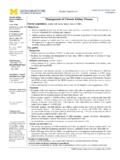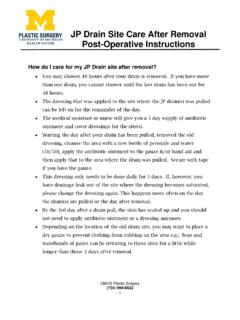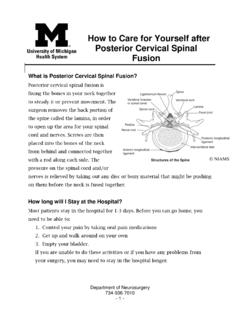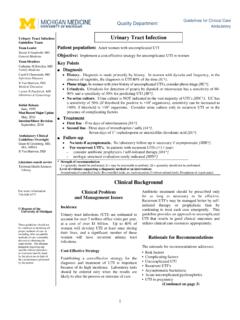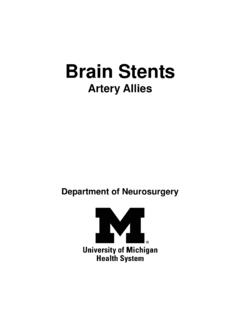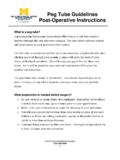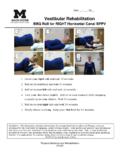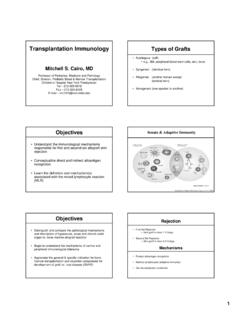Transcription of Liver Transplants at University of Michigan Hospital
1 Liver Transplants at University of Michigan Hospital The University of Michigan is a national leader in Liver transplantation , as well as the surgical and medical management of patients with Liver disease. Since 1985, our physicians and staff have provided care to more than 2,000 adult and pediatric Liver transplant recipients. At the University of Michigan Health System (UMHS), state-of-the-art equipment and facilities ensure patients the highest quality care. Electronic records are continually updated, meaning patient records are available to caregivers 24 hours a day, seven days a week. This system also allows for the tracking of all outside lab work and diagnostic studies for each patient.
2 Allows patients to review test results, request prescriptions, request clinic visits and send non-urgent messages to their health team. Normal Liver Function The Liver is the largest solid organ in the human body and plays a vital role in regulating many life processes. In an average adult, the Liver weighs approximately three pounds and is about the size of a football. It is located in the right side of the abdomen and is protected by the rib cage. The Liver plays a major role in the composition and circulation of blood, therefore, it impacts all body systems. Some of the Liver 's many jobs include: Making proteins to help blood clot Clearing some wastes from the body Making bile, a yellowish-green fluid needed for digestion and absorption of food and vitamins Storing food to be used as energy (glycogen).
3 Storing vitamins, minerals and iron Purifying blood by breaking down and removing A Healthy Liver medications and poisons, such as alcohol and nicotine Why You May Need a Liver transplant The Liver can continue to perform with quite a bit of damage. However, when the Liver becomes badly damaged, it cannot grow enough new Liver tissue to heal itself. When this happens, normal Liver tissue is replaced with scarred Liver tissue and the Liver cannot continue to do the work it is supposed to do. When the majority of normal Liver tissue is replaced by scar tissue, the Liver is said to be cirrhotic and a Liver transplant may be the only effective treatment. The indication for Liver transplantation at the University of Michigan Liver Pre- Liver transplant | 1.
4 transplant Program is severe, irreversible, acute or chronic Liver failure for which there is no other effective medical or surgical therapy. Patients with certain Liver tumors or rare Liver -based metabolic defects also may be considered for Liver transplantation . Liver failure happens when the Liver is unable to perform its normal functions. A diseased Liver can result from a sudden (acute) failure as a result of an infection or a drug or toxin reaction, or it may result from a gradual failure (chronic) due to a large number of long-term diseases. The causes of acute Liver failure include (but are not limited to) drug-induced Liver injury, fulminant (sudden/severe) Liver failure, and Budd-Chiari syndrome.
5 The causes of chronic Liver disease include (but are not limited to) hepatitis B, hepatitis C, alcohol abuse, primary biliary cirrhosis, primary sclerosing cholangitis, autoimmune hepatitis, fatty Liver , drugs, toxins and others. Some Liver diseases are inherited, such as Wilson's disease, alpha-1 antitrypsin deficiency and hemochromatosis. When the cause of chronic Liver failure cannot be determined, the diagnosis is cryptogenic cirrhosis (meaning we cannot find the cause of the Liver disease). Other causes of Liver diseases for which the only effective treatment is Liver transplantation include early-stage primary Liver cancer, severe cystic disease, or rarely other tumors in the Liver which are causing severe symptoms.
6 The signs of Liver failure may include: Feeling very tired, fatigued Forgetfulness, confusion or even coma (encephalopathy). Tendency to bruise and bleed easily Itching (pruritis). Yellow skin and eyes (jaundice). Buildup of fluid in the abdomen (ascites). Bleeding in the stomach, esophagus or intestines (varices). Muscle wasting Weight loss Cholangiocarcinoma Some patients diagnosed with cholangiocarcinoma (cancer of the bile ducts) may benefit from and be eligible for Liver transplant . The University of Michigan follows a United Network for Organ Sharing (UNOS) approved protocol that allows some patients access to deceased donor livers based on specific criteria. Patients may be eligible for transplant if their cholangiocarcinoma is not fast growing or extensive.
7 2 | Pre- Liver transplant The Initial Pre- transplant Evaluation Appointment A Liver evaluation appointment is actually a series of visits with several doctors and other members of the transplant team, generally all occurring on the same day. During the initial evaluation appointment you will generally see the Liver specialist (hepatologist) first. If your medical condition indicates a Liver transplant would be appropriate, you will meet with several other members of the transplant team. Team members you are likely to see on evaluation day include a transplant coordinator, social worker, transplant nurse, transplant surgeon, financial coordinator and dietitian. You Should Know The role of each transplant Each member of the team has a specific role in the team member is explained in evaluation process.
8 The transplant Team section of this guide. transplant Evaluation Testing The testing required to assess whether you are an appropriate candidate for Liver transplant is quite extensive. Many of the initial tests are ordered on evaluation day, but are often scheduled on other dates. Testing is important to the transplant committee as it provides information regarding your medical status that is used to help determine your placement on the transplant list. Testing also helps assess whether you have other medical issues which would impact the outcome of transplantation , such as significant heart disease, lung disease, kidney disease or Liver cancer which may be too advanced for transplant .
9 You will be given written orders for the tests you need. Tests done at UMHS do not require written orders; they are entered electronically. You also will receive instructions for completing the testing through your doctor and/or dentist. As testing is completed, the results need to be faxed to the transplant coordinator at the fax number below. Occasionally, transplant physicians will require some testing You Should Know be performed at UMHS. You will be advised when that is required. Blood tests and other required tests are explained Other testing may be ordered by the transplant team if on page 13. there are abnormalities in your initial testing or if the team needs further information to determine whether you are an appropriate Liver transplant candidate.
10 These tests can include pulmonary function tests, additional blood work, CT Scan/MRI, heart catheterization, etc. If any of these tests are recommended, you will be given the information regarding the test before the appointment is made. Pre- Liver transplant | 3. Reports from tests done outside UMHS should be mailed or faxed to: transplant Center, Liver Program University of Michigan Health System 300 North Ingalls St., Room 5D17. Ann Arbor, Michigan 48109-5415. (800) 333-9013. (734) 998-2384 Fax No patient will be put on the transplantation list until all tests are completed and the results confirm that Liver transplant is appropriate. Therefore, please make sure all tests are completed and results are sent to the transplant office as soon as possible.
